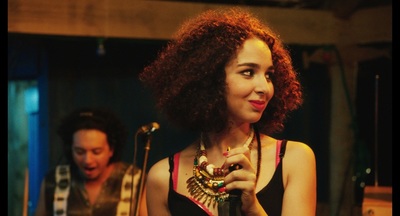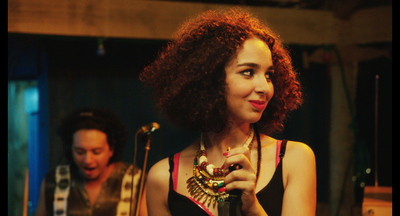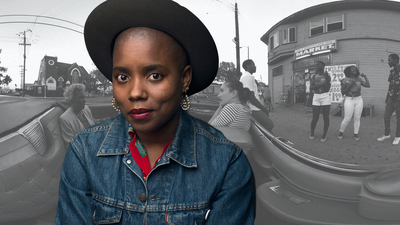
BY MELINA GILLS |
Israeli Filmmakers Oren Moverman & Udi Aloni on Addressing Palestinian & Arab Conflicts Through Hip-Hop
JUNCTION 48 will have its North American premiere at the 2016 Tribeca Film Festival. Here, the director, Udi Aloni, and co-writer/executive producer, Oren Moverman, discuss the film's genesis and the inherent politics of cinema.

Junction 48 premiered earlier this year at the Berlin Film Festival, where it received the Panorama Audience Award, and now comes to Tribeca for its North American premiere. It's directed by award-winning filmmaker and activist Udi Aloni and co-written and executive produced by Oren Moverman, who has written and directed films like The Messenger and Rampart. The film stars Tamer Nafar, who co-wrote the script based on his real-life experience growing up in Lod, Israel, and founding the celebrated rap group DAM.
While painting an optimistic picture of the possibilities of music in the midst of violent tensions, Junction 48 doesn't shy away from depicting the dark realities of life in Lod. Aloni's film shows the widespread discrimination against Arabs, the forced and violent removal of Palestinians from their homes, and the self-destructive drug-dealing politics within the Arab community. Against both indifference and violent radicalization, the pursuit of music is presented as a fulfilling but deeply challenging ambition.
Ahead of Junction 48's first Tribeca screening on Friday, April 15, Aloni and Moverman spoke to TribecaFilm.com about the inspiration behind the film and its inherently political substance.
The Love of Music Gives Shape to Junction 48
Resistant to making a film in Israel despite many offers, Moverman was finally moved to make Junction 48 after longtime friend Aloni put Nafar's music on his radar. "Aloni and I were talking as friends," says Moverman, "and he mentioned Tamer [Nafar], rap, and Lod, and it immediately struck me that this was a movie that needed to be made.” Aloni had met Nafar while shooting his first film, Local Angel, and introduced him to Moverman, who had already written two widely acclaimed music-related films, Love and Mercy and I'm Not There. "I love music as much as, if not more than, movies, and I'm drawn to the mystery of that creative place," explains Moverman. "Musicians intrigue me. Tamer isn't only a musician I admire, he also belongs to a place and time and political and national situation. All these elements are working at the same time, filtered through the music."
"The biggest challenge was to finally agree to do a film that takes place in Israel," he continues. "I've been approached many times to do one, but it's not something I've ever wanted to do. It's part of my identity but not my work. But I was really drawn to the energy of Tamer's music, and I was moved by a language [Arabic] I don't understand. In it, you feel the desire for change, a rage that wasn't stupid but rather intelligent and well-communicated. I was drawn to this much more than I would have been to a Jewish-Israeli subject." He asked Tamer to write his life down in a journal. "There were so many very personal and revealing things in it. He didn't hold back."

The Politics of Cinema
"Everything is political [in Israel]," says Moverman. "Getting out of the bed in the morning is a political act. We never talked about it as a movie with a political message; we never tried to raise a flag. We were telling Tamer's story through Kareem. We were trying to show Lod, which is a very particular city that even Israelis don't know about it. Kareem sings, 'This is not political,' with a wink. Tribeca came from the ashes of September 11, and in this country, there's a certain idea of what an Arab is; this movie shows you something else, a different kind of world that does not fall into easy stereotypes. It says, 'This also exists,' and provides a portal or window into a different world."
Aloni, for his part, has long been involved in efforts to bring peace and justice to Israel and Palestine. He first saw art's groundbreaking possibilities when working at the Freedom Theatre in Jenin, Palestine, which was opened by Juliano Mer-Khamis, a former Tribeca winner for his 2004 documentary Arna's Children. Mer-Khamis was assassinated in 2011.
"I perform my Jewishness through my solidarity with Palestinians," says Aloni. "You don't have a dialogue between oppressors and oppressed; you need to create a new space. We needed a place of non-violence. Juliano was murdered with five bullets. He was close to Tamer and me; we are a gang who make radical art, to try to create a new language but also keep our own identities. Art isn't so black and white. We want to create a place of art, theory, and politics. Creating high quality art is the highest political move."

Male Violence and Women's Rights
"Many of my movies are about male behavior, identity, and conflict, which is at the root of every problem," says Moverman. "That's why we want to get rid of them and have women take over—I'm only half kidding. I think violence is part of the male persona and part of the political world we're both from. I try to create characters who are sensitive to issues of violence and conflict, and that creates good drama. These men have to put up a certain persona, and seeing it break down is interesting."
Aloni adds, "Part of the reason for the abuse of women is poverty and oppression. There's a context, and Oren was able to create layers of stories that show the interaction of different elements. In Lod, everyone adored Tamer there, except for those who do not respect him because his fight for women rights. The young people adore him as a star. When the film is released, I think Tamer will have problems with the community. In the last year, 20 women have been killed in 'honor killings,' and Tamer is one of the strongest voices for equal rights for women."
Solidarity and the Unifying Power of Cinema
"Behind the scenes, it's a big gang walking and screaming in Arabic and Hebrew, totally in love with one another," says Aloni of the film's power to connect Arabs and Jewish-Israelis. "We cannot stop the flood, but we can have a kind of Noah's Ark where we bring the weird voices in who can offer a language of solidarity."
Aloni suggests audiences shake their prejudices to truly embrace the film. "Take off your ideological glasses, and come to see the story we are telling you. We really tried to tell something beautiful here. The biggest present as an artist is to be allowed to take part in the art and cinema movements in Palestine. The creativity that comes out of oppression is innovative and beautiful."
Junction 48 will have its US premiere on Friday, April 15, at 5:00 p.m. Additional screenings will take place on Sunday, April 17, at 4:00 p.m.; Wednesday, April 20, at 5:00 p.m.; and Thursday, April 21, at 10:00 p.m. Buy tickets here.


